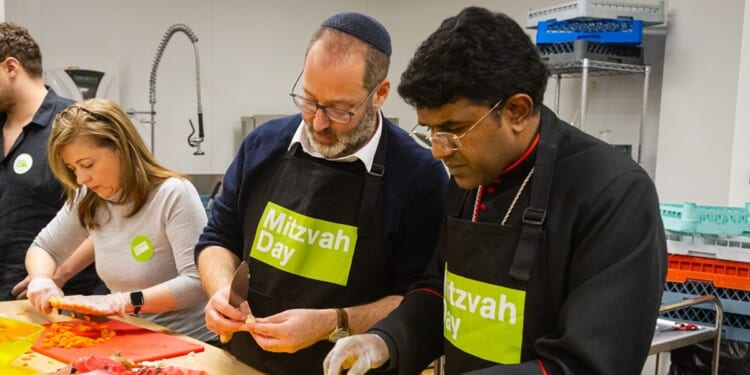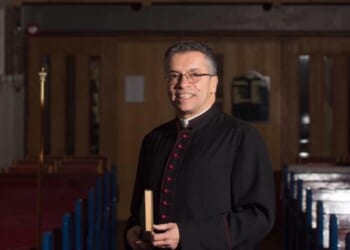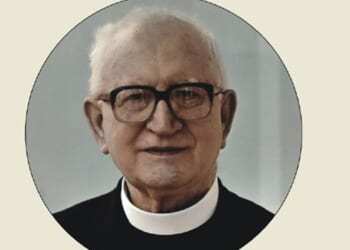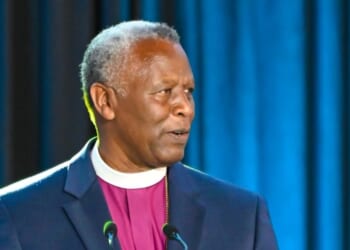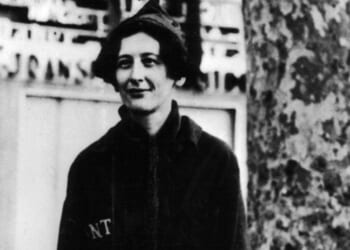A CALL to “redouble” efforts to rebuild interfaith relationships, made by the Home Secretary last month, had a tangible response on Sunday as the 25th Mitvah Day got under way.
In the kitchen of Alyth, the North Western Reform Synagogue in Golders Green, Rabbi Josh Levy, co-lead of Progressive Judaism, could be found chopping onions next to the Bishop of Edmonton, Dr Anderson Jeremiah, while Fauzia Saeed, programme and partnerships lead for the Muslim World League London Office, operated the stove.
The mass production of soup — destined for the network of night-shelters run by local places of worship, and the refugee drop-in centre at the synagogue — concluded a day of social-action work across the UK involving 200 projects and thousands of people from different faiths.
For Laura Marks, the day marked the 20th anniversary of her founding of Mitvah Day as a “Jewish-led-day social action where we reach out to our neighbours and invite them to come and do good deeds with us” Interview, 8 May 2020). On Sunday, she paid tribute to the “tiny staff team” who had worked hard to bring the day together, and expressed hope that those gathered would “invite us to more of your things, and that friendships and relationships will continue”.
In addition to Mitvah Day, she co-founded Nisa-Nashim, a national network which brings together Jewish and Muslim women to inspire and lead social change.
On Sunday, Ms Saeed, who described Ms Marks as a “dear friend”, said: “We always support each other when it comes to community cohesion, interfaith work, and we love it.”
Interfaith work had previously been male-dominated, she said, but this was no longer the case. “There are many women who are really leading the way to change narratives and work hand-in-hand with male colleagues,” she said. “Interfaith gives opportunities for people to understand other communities and work together for the common good.”
Directing the soup production was Rabbi Hannah Kingston, who observed that Mitvzah Day had a particular resonance during a time of wider division in the country. Last month, the Home Secretary, Shabana Mahmood, told MPs: “I think everybody who has been involved in interfaith work in the last two years, myself included, will acknowledge that there have been real challenges and difficulties there. We have to think more creatively, and redouble our efforts to rebuild relationships that have been deeply strained.”
The Prime Minister has also expressed regret that some of the interfaith work in the UK — “which we all thought was stronger and more robust than it turned out to be”— had fallen away in the wake of the 7 October 2023 attacks on Israel and subsequent war with Gaza. This followed a warning in 2024 by the former Archbishop of Canterbury, Justin Welby, that interfaith dialogue had “almost collapsed”.
On Sunday, Rabbi Levy said: “It’s true that interfaith relationships have been difficult over the past two years, but where they have continued, and where they have remained strong, is where people have got really deep relationships already.
“One of the things about something like Mitzvah Day is, it’s one of the places you form those relationships, where you have those encounters with one another, where you get to do side-by-side interfaith, where you are doing this work together.
“As well as 20 years of building those relationships, it’s a day that is continuing to bring people who don’t know each other together to do that kind of work. It’s a really important part of our calendar because of that.”
“Mitzvah” meant “commandment”, he said, and the day was about “doing good things, fulfilling our religious responsibility. One day of real focus on being good in the world.” Helping others remained really important, whatever happened politically, he said. “Real people wanting to do good things in the world to make the world a slightly better place is really fundamental to our religious lives.”
On Tuesday, Dr Jeremiah said: “Against the backdrop of growing national and local polarisation, Mitzvah Day is an indispensable opportunity to meet, share, and renew our shared commitment and forge strong solidarity across faith lines that fosters stronger local relationships.
“We cannot allow divisive, external narratives to erode the trust in our neighbourhoods. My goal, as a bishop, is to see every member of this wonderfully diverse city feel safe, thrive, and contribute to communities resilient enough for any challenge.”

